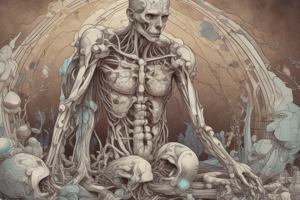Podcast
Questions and Answers
Pain is an unpleasant sensory experience associated with potential tissue damage or described in terms of such damage.
Pain is an unpleasant sensory experience associated with potential tissue damage or described in terms of such damage.
True (A)
Chronic pain is usually easy to 'see' and lasts for a few days or weeks.
Chronic pain is usually easy to 'see' and lasts for a few days or weeks.
False (B)
Poorly managed acute pain may lead to chronic pain syndrome.
Poorly managed acute pain may lead to chronic pain syndrome.
True (A)
Cultural and societal attitudes are not risk factors for pain.
Cultural and societal attitudes are not risk factors for pain.
Trauma is not a cause of acute pain.
Trauma is not a cause of acute pain.
Older adults are not at risk for pain.
Older adults are not at risk for pain.
Neuropathy is a type of chronic pain.
Neuropathy is a type of chronic pain.
Assessment of pain does not include the location of pain.
Assessment of pain does not include the location of pain.
What are the three essential components of neurologic examinations measured by the Glasgow Coma scale?
What are the three essential components of neurologic examinations measured by the Glasgow Coma scale?
What is the lowest possible score a patient can achieve on the Glasgow Coma scale, and what does this score indicate?
What is the lowest possible score a patient can achieve on the Glasgow Coma scale, and what does this score indicate?
What is the highest possible score a patient can achieve on the Glasgow Coma scale, and what does this score indicate?
What is the highest possible score a patient can achieve on the Glasgow Coma scale, and what does this score indicate?
What is the significance of a Glasgow Coma scale score of 7 or less?
What is the significance of a Glasgow Coma scale score of 7 or less?
What are the three main components of every Coma scale?
What are the three main components of every Coma scale?
What is the abbreviation for the Glasgow Coma scale?
What is the abbreviation for the Glasgow Coma scale?
What is the primary role of a nurse coordinator in a critical care unit?
What is the primary role of a nurse coordinator in a critical care unit?
What is the significance of a critical care unit being equipped with sophisticated monitoring and emergency equipment?
What is the significance of a critical care unit being equipped with sophisticated monitoring and emergency equipment?
Why is it essential to have a highly skilled and collaborative multidisciplinary team in a critical care unit?
Why is it essential to have a highly skilled and collaborative multidisciplinary team in a critical care unit?
What is the primary consideration when planning a critical care unit?
What is the primary consideration when planning a critical care unit?
What is the purpose of specialized critical care units, such as burn units or coronary care units?
What is the purpose of specialized critical care units, such as burn units or coronary care units?
What is the role of the critical care nurse in ensuring quality care?
What is the role of the critical care nurse in ensuring quality care?
Why is it important for critical care units to have access to all support departments?
Why is it important for critical care units to have access to all support departments?
What is the primary focus of critical care services?
What is the primary focus of critical care services?
Flashcards are hidden until you start studying
Study Notes
Pain Management
- Pain is an unpleasant sensory and emotional experience associated with actual or potential tissue damage, or described in terms of such damage.
Types of Pain
- Acute pain: a complex, unpleasant experience that occurs in response to body trauma, usually easy to identify, and lasts for a few days or weeks until healing has occurred.
- Chronic pain: pain that lasts for more than three months, or beyond normal healing time, and can disrupt sleep, mood, and normal living.
Causes of Pain
- Trauma
- Surgery
- Cancer
- Arthritis
- Neuropathy
Risk Factors for Pain
- Cultural and societal attitudes
- Lack of knowledge
- Fear of death
- Exaggerated fear of respiratory depression
- Populations at risk: infants, children, older adults, clients with substance abuse problems
Information Gathering for Pain Management
- Location of pain
- Character and quality of pain
- Duration of pain
- Aggravating/relieving factors
Physical Therapies
- Mild to moderate exercise, including massage and topical heat/cold therapy, can improve function and reduce pain.
Pharmacological Therapies
- Three main types of medicines used to manage pain:
- Simple analgesics (e.g., paracetamol)
- NSAIDS (non-steroidal anti-inflammatory drugs) (e.g., aspirin, ibuprofen, diclofenic)
- Opiates (e.g., codeine, tramadol, morphine)
Importance of Pain Management
- Proper pain management is crucial to prevent chronic pain syndrome and improve quality of life.
- Unmanaged pain can lead to anxiety, fear, depression, and poorly managed acute pain.
Neurologic Observation: Glasgow Coma Scale
- Provides an objective measurement of three essential components of neurologic examinations: spontaneity of eye opening, best verbal response, and best motor response.
- The total score ranges from 3 to 15.
- A patient who is unresponsive to painful stimuli, does not open their eyes, and is flaccid has a score of 3.
- A patient who is oriented, opens their eyes spontaneously, and follows commands scores 15.
- A score of 7 or less is equal to Coma.
Components of the Glasgow Coma Scale
- Eye opening:
- Spontaneous (4)
- Response to speech (3)
- Response to pain (2)
- None (1)
- Verbal response:
- Oriented (5)
- Confused (4)
- Inappropriate words (3)
- Incomprehensible sounds (2)
- None (1)
- Motor response:
- Obeys commands (6)
- Localizes to pain (5)
- Withdraws from pain (4)
- Flexion in response to pain (3)
- Extension to pain (2)
- None (1)
Roles of the Nurse in Critical Care Unit
- Critical care nurses are part of a multidisciplinary team that provides care to critically ill patients who have life-threatening or potentially life-threatening health problems.
- The nurse's role involves continuous monitoring and intervention to prevent complications and restore health.
- A nurse coordinator supports the patient and family in setting realistic goals and respects their informed decision-making.
- The nurse helps the patient obtain necessary care and respects their values, beliefs, and rights.
- The nurse educates the patient on their right to choose and ensures quality care.
Planning of Critical Care Unit
- A critical care unit is a specially designed facility staffed by skilled personnel to provide effective and safe care for patients with life-threatening health problems.
- Critical care services require specialized facilities, equipment, and nursing staff, as well as a wide range of support services.
- An integrated plan is essential to provide optimal care at the lowest possible cost.
- Critical care units can be generalized or specialized, such as:
- Burn unit
- Neonatal unit
- Coronary care unit
- Postoperative cardiothoracic unit
- Renal unit
Studying That Suits You
Use AI to generate personalized quizzes and flashcards to suit your learning preferences.





